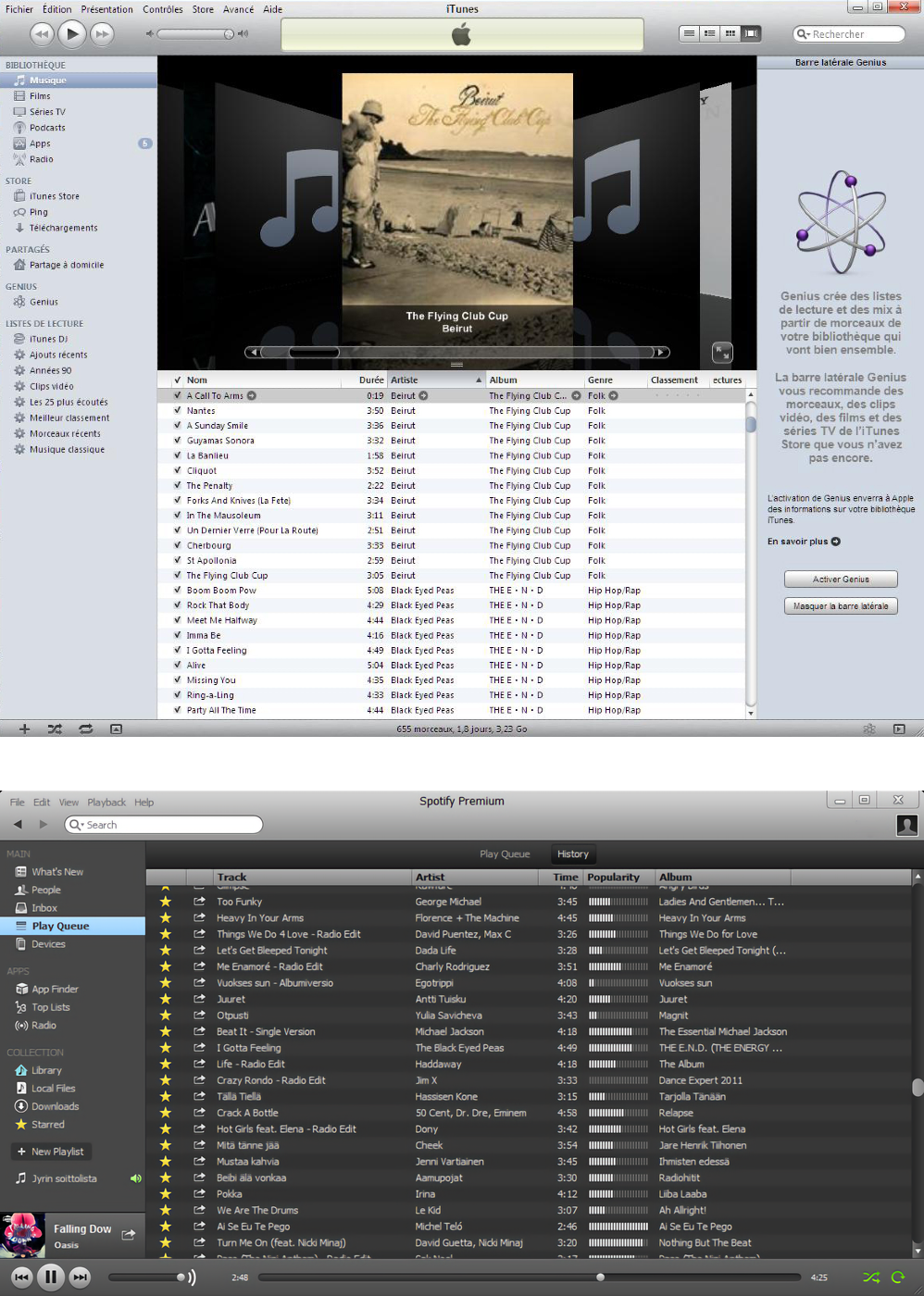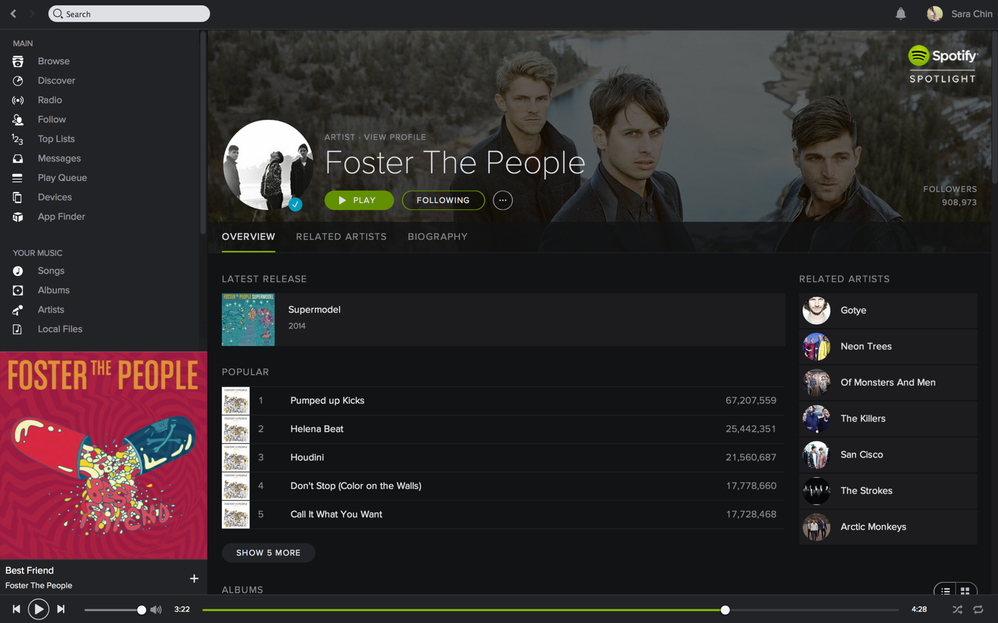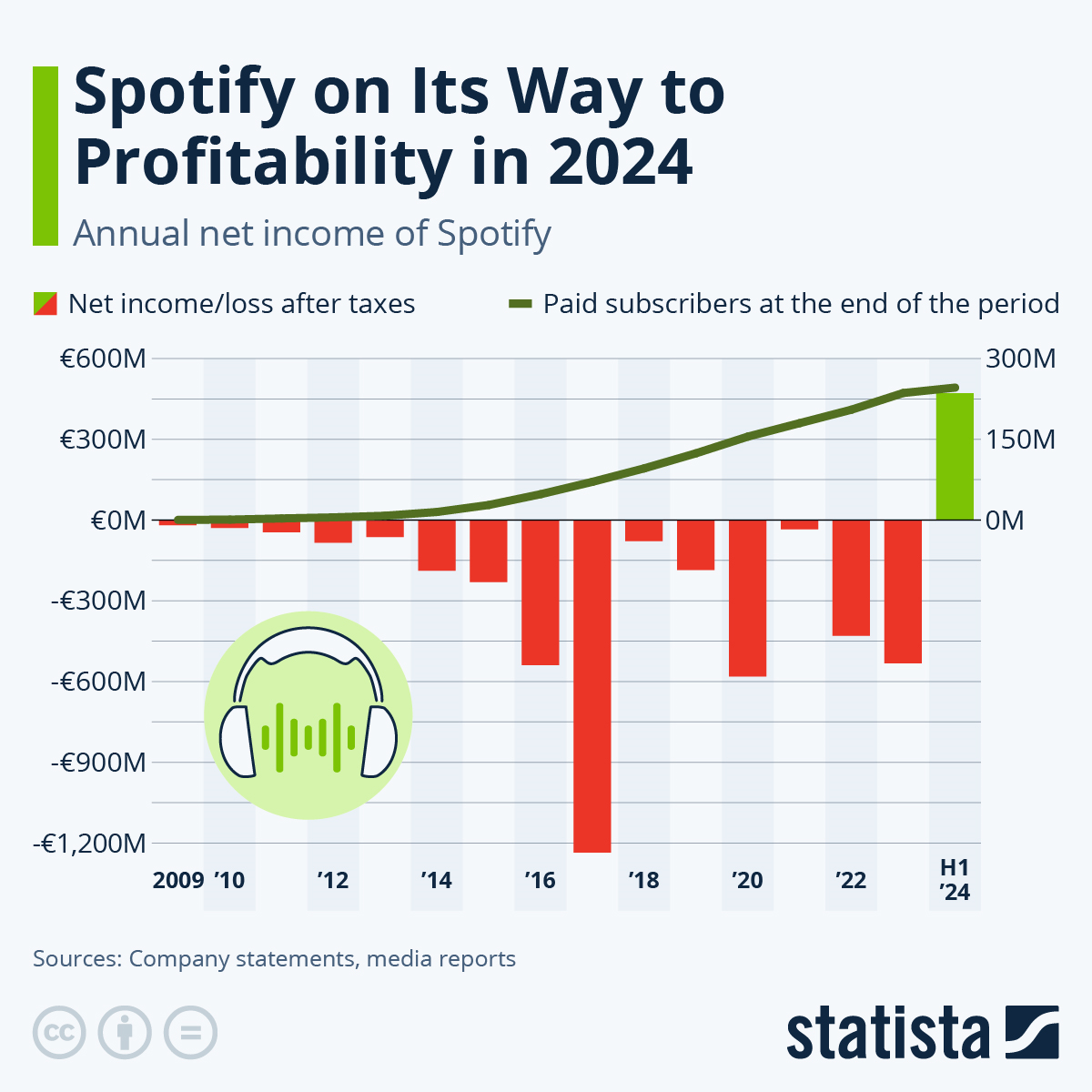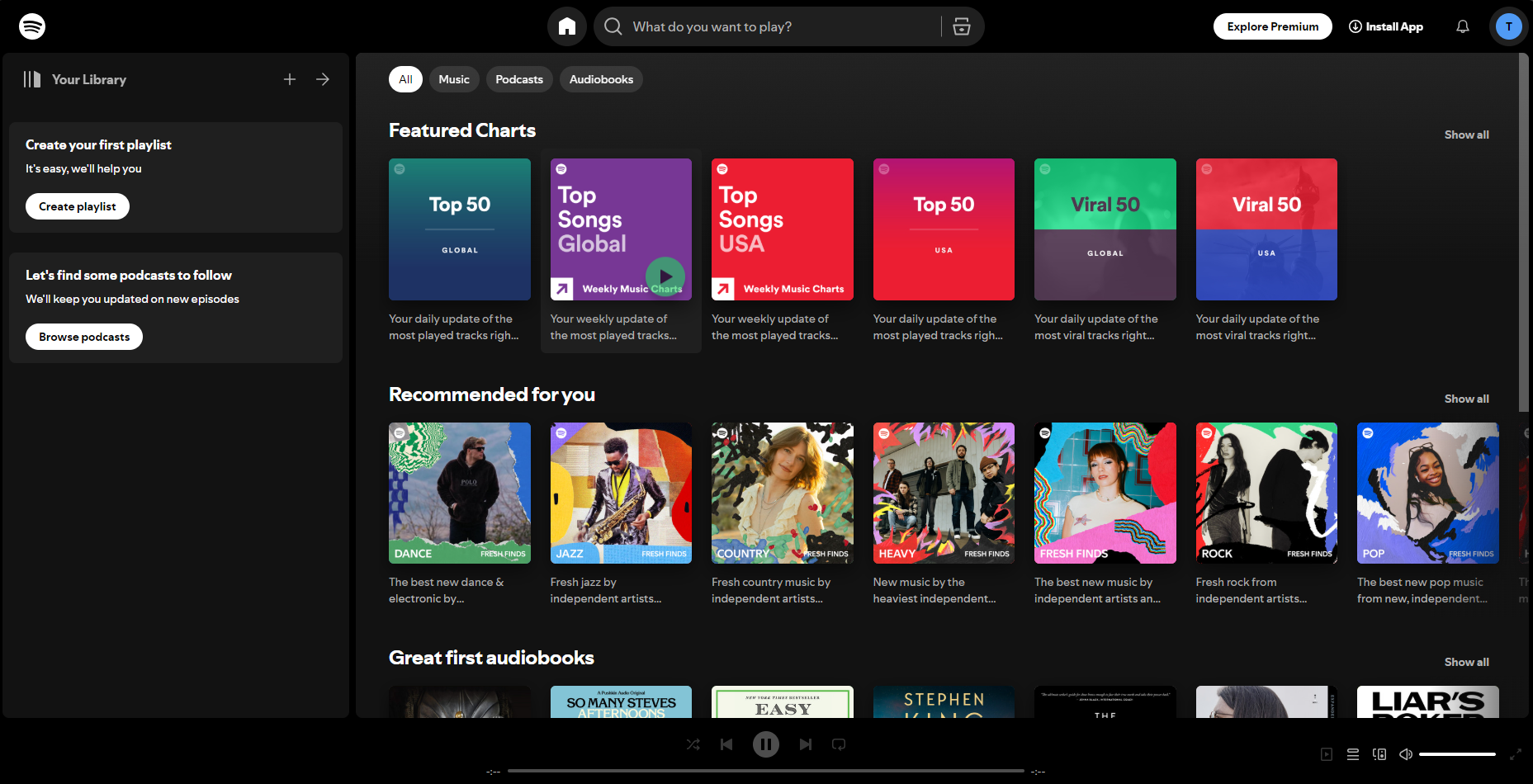1/15/2025
Spotify is Destroying the Music Industry to Make Ends Meet

Spotify is an active detriment to the artists using it. It's a worse experience for the listeners every day. So who is Spotify even for anymore? Shareholders, specifically the ones that don't use Spotify.
Where Did This All Start?
Founded in 2006, Spotify led a limited launch in the UK in 2009, and a US launch in 2011. It offered a freemium model of music streaming, meaning free at point-of-use, supported by intermittent advertisements. Users could also opt to pay for ad-free listening. At the time, this freemium model still a fairly novel concept. Pandora had been around for a few years, but music streaming was still in its nascency.
This was all in response to the problem of music piracy at the time. The industry at large had been shouting at the rooftops about it for a good while, and a compromise needed to be reached. Piracy is at its core a problem of convenience. If someone can make a solution that is more convenient to the end user than just pirating it, largely people will choose to do so. People don't like risks, they don't like feeling like they've stolen, etc. They want to support artists. Spotify was one of these growing ways to do so.
It offered a different approach than its competition at the time, Pandora. Pandora is focused on an idea of curated stations of music, rather than picking individual tracks. In contrast, Spotify offered an extensive library that you could pick and choose from at will. Users flocked to this world-at-your-fingertips approach, complete with additional curation on top with editorial playlists. It hit 10M paid subscribers by 2014, and has peaked since then with over 640M monthly users and 250M paid subscribers.
It was not shy about its influences early on. iTunes was still the player in the music sales game, and the Apple was still enjoying dominance with iPods and the recently launched iPhones. So, why reinvent the wheel? Early Spotify looked nearly identical to iTunes. Plenty of early tech coverage remarked the same. Consumers at the time were still getting comfortable with the idea of streaming content, so they made the transition as easy as possible. It just makes sense.

uh there will be a picture here, just when I went to get a screenshot the host was down so i'm gonna try again later
For artists, Spotify was great too. This was a largely new market, so much of what was made was just gravy. Music was still a sales first industry at the time. Payouts weren't too dissimilar from what they are now, from the limited information I can find, but their algorithm favored artists more, and the rates only went up for a time from there. Business was booming on all fronts. Spotify wasn't making money, but that wasn't the point. You've got to spend money to make money, and investors were OK with that.
Wait, Spotify, What Are You Doing?
In my mind, 2014 was the beginning of the end. Competitors from major players were either already going (Google Play Music launched in 2011, Bandcamp launched in 2008, Soundcloud launched in 2008, Deezer launched in 2007, Amazon Music launched in 2007, YouTube launched in 2006) or were just around the corner (Apple Music launched in 2015, Tidal launched in late 2014, YouTube Music launched in late 2015). Pressure was rising quickly and they couldn't just ride goodwill and nice vibes anymore. In the beginning, they were one of very few offering the unique service of "free" access to all of music. Now, the field is full and services are folding left and right. It was this year that saw their first big redesign to what I will call peak Spotify.

2014 is when business started getting complicated. The competition put them under an intense pressure to innovate, expand their catalog, and add new features. R&D and content acquisition costs naturally explode. Taylor Swift famously pulled her music from the service this year as well, claiming it was undervaluing art in a Wall Street Journal Op-Ed. This marked the start of an extremely downward trajectory in net income, ending 2014 with what was an at the time record low of -$170M, which careened downwards until 2017 where it hit an eye-watering -$1.2B (which stands as their record low to this day).

Acquisitions are a big part of the huge losses posted. Buying is easier than developing, and usually quicker too. They started acquiring companies in 2013 with Tunigo (a music discovery app), followed by The Echo Nest (a music data company) in 2014, and Seed Scientific (a data science company) in 2015. Then 4 companies in 2016, 5 more in 2017, 1 more in 2018, 4 more in 2019, 2 in 2020, 5 in 2021, and 5 in 2022. These numbers are dramatic, and so were the moves Spotify was making.
The first cluster of acquisitions (2014-2017) forms what I like to call the Algorithm Era. Outside of those already listed, Spotify also picks up more companies involved in social platforms, audio detection, and analytic improvement. It leads up to them announcing Discover Weekly in 2018, their first big push for automated content curation. This is quickly followed by other thematic playlists, Daily Drive, Release Radar, etc. Now, Spotify isn't just an app, it's where you find the next big thing. The monthly active user numbers reflect that, making a marked increase over their more consistent growth the last several years. This user growth trend would continue to grow until last year where things have slowed dramatically.
The second cluster (2018-2022) forms the Podcast Era. They quickly spend over $1B in acquiring exclusive rights to several major podcasts and buying some studios outright. The Joe Budden Podcast, The Last Podcast on the Left, The Joe Rogan Experience, and Call Her Daddy all sign exclusivity deals with them over the next few years, spending hundreds of millions of dollars. They buy several major podcast studios including The Ringer (The Bill Simmons Podcast, The Rewatchables, many others), Parcast (Serial Killers, Unsolved Murders, and many others), and Gimlet Media (StartUp, Reply All, and many others), and podcast startups such as Podz and Locker Room.
Where Does That Leave Us?
It's 2025, a.k.a. the end of Spotify as we know it, and the service is worse than ever. However, they managed to ring in the New Year with their first profitable year ever. Of course, that came at the cost of a lot of jobs, including more than 15% of all employees which itself came after several high-profile closures and restructurings. This, in the words of Spotify cofounder Daniel Ek, "...did disrupt our day-to-day operations more than we anticipated." This also comes after a change to their royalty payout formula, which cuts songs with less than 1000 streams in a 12-month period out of the pool entirely, which is compounded by their pro-rata model for royalty payout. In short, if Taylor Swift gets 10% of all streams in a given month, then 10% of the total pool of all the user's subscription fees go to her. The International Federation of Musicians puts it like this:
In the pro rata model, the users’ monthly fees generate a total amount, from which the money is distributed in proportion to all listening times. The model, therefore, favours the right holders of the most listened tracks.
In the alternative user-centric model, the right holder’s compensation is based on the number of listening times of an individual user: how many different tracks the user is listening and how many times. If the user concerned would listen to only one track, would his/her whole monthly fee be paid to the track’s rightholders. Therefore, the difference compared to the pro rata model is that it would, in principle, increase the compensation of the right holders of less listened tracks, and, on the other hand, reduce the compensation of the most listened music.
-Streaming: Pro-Rata vs. User-Centric Distribution Models, FIM, retrieved 1/15/2025
The user-centric model is much more representative of what people think happens with subscription money. You listen more, they get more of your money. Now there's a floor they need to reach before they can even
Something not widely talked about enough is Spotify's problems with porn and piracy. Well documented and easy to find, it's a problem that will only get worse without signficant effort on their part, which is not in their best interest, nor particularly possible with them slashing jobs left and right. It forms some of the absolute trash clogging up the service, crowding out actual artists, trying to make an actual living from writing actual music.
Speaking of actual artists, Spotify is facing more scrutiny than ever regarding accusations of creating ghost artists, or fake artists that are made by Spotify, usually listed with music licensed from a musician for a flat fee, so that Spotify gets to keep their portion of royalties. Spotify has denied these claims, but these claims span back to 2016 and have been reported time and time again by reputable outlets, including Music Business Worldwide, Vulture, and Swedish newpaper Dagens Nyheter. Reports also revealed in 2022 an internal program called "Perfect Fit Content" (PFC) that commissions music and places it in curated Spotify playlists.
To stack the deck with their own artists, which will get listeners recommended even more Spotify-owned tunes by way of adjacency to what they've already listened to, is troubling to say the least. It shows a fundamental disrespect of the artists that made Spotify what it is, in favor of curating an invisible easy listening powerhouse to line their pockets.
As an artist trying to make in Spotify's hostile waters, you need playlist placements, preferably featured ones. In the current structure of Spotify's algorithmic discovery, plays, etc., playlist placement is king. It has been for some time now. The process seems... unpleasant. Look at this guide on how to pitch Spotify. Worse yet, this is just for Spotify's playlists. Plenty of popular third party playlists operate with a pay for play system and worse. As an example in motion, here is my homepage as a new user:

First, so much dead space. Compare what you see here with their original, or even redesign. It used to be that music was everything. Now Spotify is a content platform, and music feels like its fighting for its life. Cetainly anything that isn't already big is. No longer is music enough, it wants to throw you into their full content pool as soon as possible. What Spotify wants me to engage with is what is already popular, what they recommend to me despite knowing nothing, podcasts (many of the most popular of which they own), or Audiobooks. Interface largely informs what a user thinks is available, and this tells me that I don't need to worry about it, they know best.
Further problematizing this depreciation of artists is the rise of AI-generated music. Several executives have been quoted in favor of it, having no issue with it being on the platform, like Gustav Söderström, CTO, CPO, and co-president of Spotify:
...For [Avicii], the digital audio workstation was what Steve Jobs would call "a bicycle for the mind". It meant that he could get more productive, and he could express his genius. And the big question with this next round of tools is the same: is [AI] amplifying creativity, or is it replacing people?
I think it's amplifying creativity. It's giving more and more people access to be creative. You need even less motor skills than on a piano. You need less technical skills than their own workstation. So I think of them as tools.
And there's this interesting question of what is A.I. music? I think people say A.I. music, and they mean something that was prompted with not too much of a prompt and not too much work, like it's one hundred percent A.I. But the truth is that much of music being made today is a combination. I think many of the big artists are using AI for parts of their songs, or parts of the track, or the drums, etc.
So I think there's actually a scale between zero A.I. and one hundred percent A.I. And we're on this progression where it's actually going to be very difficult to say, what is an A.I. song?
-Gustav Söderström, in an interview with Big Technology, 11/13/2024
This answer, and every other answer he gives, only serves to muddy the waters. Spotify have no reason to have an issue with AI music, because it will make them money. It lets them boast a bigger catalog, more artists, more listens. His language apes the talking point of AI "democratizing" music, which is, frankly, bullshit. Music is an expression of self. Playing an instrument, singing, etc. is not a barrier, it is a part of music. There is in fact an entire genre of people who don't know how or weren't taught how to play instruments doing so anyway: outsider music. People with varying abilities make music all the time. They too have said AI music is not music. To act as though typing "Make me a sad song about my girlfriend but make it sound like Jason Mraz" is worthy of any consideration as art, as music, is laughable.
They fundamentally do not care about art. It is not a part of their business model. There is a reason their internal program is called Perfect Fit Content, it's just filler. What it is doesn't matter they serve you doesn't matter to them as long as you pay. They are a tech company that happens to be involved with music, not a music company. They are a parasite on an industry that so many people struggle to make a living in.
Final Thoughts
Spotify is, fairly objectively, worse for all involved except Spotify. It's a worse experience as user, full of dead space and features you likely don't care for. It's a worse experience as an artist, fighting AI, porn, and if the reports are to be believed, Spotify itself for the chance to be heard, and God help them if they don't hit 1000 streams or get placement. Hell, it's even worse for advertisers, not knowing if your ad is going to come up next to some AI garbage or literal pornography. Labels have it worse too, as spotify continues to dimish music's presence in the app, trying to drive engagement to the things they have better margins on.
None of that matters to Spotify though, they just turned a profit. They, as far as the shareholders they have a fiduciary responsibility to are concerned, are doing better than ever. I think people can read the tea leaves though. It's over. Spotify is dead. Buying music and merch remains king. Go to a show. Revel in creation. Share music. Just don't expect Spotify to help.